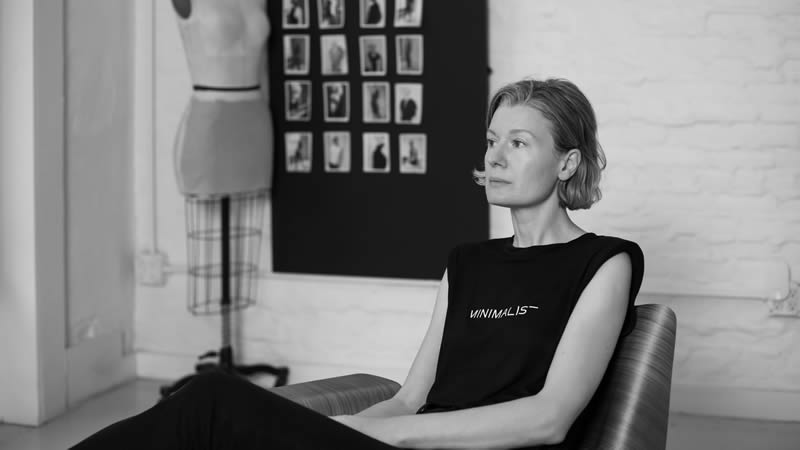
This New Women’s Luxury Brand Rejects Linear Fashion in Favor of Eco-Ethics
0
The Made in New York circular fashion club gained another member.
Minimalist is a just-launched seasonless women’s luxury brand rejecting the linear fashion system and, instead, anchoring itself in timeless design and circularity from the start.
“I’ve always known that I wanted to start my own label, but after 20 years in the industry, I also knew that the world didn’t need another fashion brand that followed the same take-make-waste linear production model that most apparel companies use today,” said Minimalist’s founder, Tamara Davydova, a Kiev, Ukraine-born designer and seasoned fashion executive who has worked alongside the likes of Michael Kors and Monique Lhuillier.
The launch includes 10 core styles, including shirts and jumpsuits in an array of fabrications, like Portuguese viscose satin, Italian velour and Japanese organic denim. The jumpsuits are finished with drawstring waists and exposed zippers. (Davydova says she only employs functional closures when necessary to ease recyclability.) Prices range from $150 for T-shirts to $725 for jumpsuits.
Davydova designed the collection for simplicity, perhaps an early impression from her undergraduate years at Parsons during the height of ’90s minimalism. Staying true to the city, the brand is produced entirely in New York’s garment district in an effort to support local factories with fair wages and opportunities.
For good measure, “the two factories where we currently produce are both woman-owned,” Davydova added.
Bolstering women is a continual thread, as Davydova said her customers are also self-described “women leaders,” founders and professionals in the arts, fashion, beauty, law, medicine and sciences. Their singular goal is finding ethical, sustainable fashion that is still chic and streamlined.
“The focus is on simplifying a woman’s life and to reduce stress from clutter and decision-making fatigue,” she said. “Everything is curated, seasonless and versatile. I want my garments to instill a feeling of calm, simplicity and confidence. I also want women to feel they’ve invested in something consciously designed with sustainable ingredients.”
Every “ingredient,” (as Davydova prefers to call her materials) of the collection — including fabrication, trim components and garment bags — is certified to some of the industry’s most-used standards. Among them are the Global Recycling Standard, Global Organic Textile Standard, Forest Stewardship Council, Bluesign and Oeko-Tex Standard 100.
This details-hungry, ingredient-led design thinking has become a repeat among new brands launching in the current climate, be it circular footwear brand Thousand Fell or sweater line Paradis Perdus, whose founders expressed diligent research before launch.
With reports increasingly shining a light on the woes of linear fashion, the case may be that if a brand is going to launch at all — it better be doing things the circular way.
For consumers hungry for the details, each product page on Minimalist’s website Minimalist.nyc features a drop-down menu with “our ingredients” listed, where customers can learn about the content, origin and certification of the collection. The brand is also endeavoring to offer wholesale options, although no partners are counted to date.
Minimalist opts for organic and recycled content in its fabrications, using single-fiber materials whenever possible to ensure the highest potential for recyclability.
“We uphold the same standards for our trim as we do for our core materials,” Davydova said. “Elastic is sourced from Austria and crafted from organic cotton and natural, biodegradable and recyclable rubber. Italian-made Oeko-Tex-certified zipper finishes are free of harmful chemicals. We use Chargeurs Sustainable 360 line shoulder pads and interlinings, which are made from GRS-certified post-consumer materials, which are recycled instead of heading into landfill. Even our garment bags are either compostable or water-soluble and marine-safe.”
Minimalist is also teaming with Fabscrap, as a solution for its leftover production scraps.
